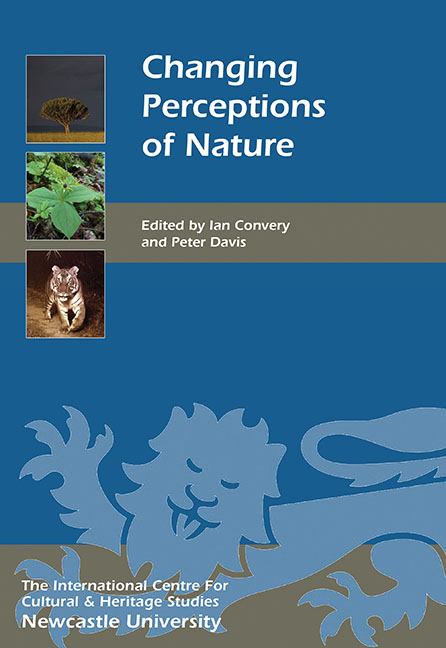Book contents
- Frontmatter
- Contents
- List of Illustrations
- Acknowledgments
- List of Abbreviations
- Foreword
- Introduction
- HISTORICAL PERSPECTIVES ON NATURE
- COLLECTING NATURE
- INTERPRETING NATURE AND LANDSCAPES
- 11 Changed Attitudes to Nature Reflected in the Transformation of Menageries to Zoos
- 12 Botanic Gardens: Changing Perceptions of Plants
- 13 Shifting Interpretations of the English Lake District
- 14 Facebook Nature: My Generation and Other Animals
- 15 Visual Narratives in Wildlife Film-making
- 16 A History of Half a Century of Wildlife Television and its Impact on Audiences
- 17 Landscape, Nature and the Contemporary Sublime in Illustrated Children's Literature
- CONSERVING NATURE
- PEOPLE–NATURE INTERACTIONS
- List of Contributors
- Index
- Miscellaneous Endmatter
13 - Shifting Interpretations of the English Lake District
from INTERPRETING NATURE AND LANDSCAPES
Published online by Cambridge University Press: 26 October 2017
- Frontmatter
- Contents
- List of Illustrations
- Acknowledgments
- List of Abbreviations
- Foreword
- Introduction
- HISTORICAL PERSPECTIVES ON NATURE
- COLLECTING NATURE
- INTERPRETING NATURE AND LANDSCAPES
- 11 Changed Attitudes to Nature Reflected in the Transformation of Menageries to Zoos
- 12 Botanic Gardens: Changing Perceptions of Plants
- 13 Shifting Interpretations of the English Lake District
- 14 Facebook Nature: My Generation and Other Animals
- 15 Visual Narratives in Wildlife Film-making
- 16 A History of Half a Century of Wildlife Television and its Impact on Audiences
- 17 Landscape, Nature and the Contemporary Sublime in Illustrated Children's Literature
- CONSERVING NATURE
- PEOPLE–NATURE INTERACTIONS
- List of Contributors
- Index
- Miscellaneous Endmatter
Summary
Whereas technological advancements in agriculture and engineering gradually reshaped the British countryside over the course of the eighteenth century, the emergence of new ideas and attitudes about nature and the nation's landscapes rapidly transformed the way that countryside was perceived. From the Highlands to the Wye Valley, previously neglected parts of Britain quickly became objects of widespread fascination. Within a few decades, the vogue for the Continental Grand Tour was rivalled by an upsurge in domestic tourism and, as one period commentator put it, ‘a desire of being acquainted with whatever is most beautiful, remarkable, or curious in our own Country’ (Goadby 1773, 3). In time, this desire would transform the cultural geography of the entire realm. In few places, however, were its effects more pronounced than amidst the lakes and mountains of Cumberland, Westmorland and northern Lancashire: the semi-peninsular landmass that now forms the county of Cumbria. Before the 1700s this region was generally considered to be an isolated wilderness, a mountainous zone cut off from the kingdom's main routes and thoroughfares. By the early 1800s it had become a fashionable resort, a haven for well-heeled travellers seeking picturesque scenery and the pleasures of rural retreat. It had become, to speak in the parlance of the age, the ‘District of the Lakes’.
This step change in the perception of the Lake District is firmly attested by the various accounts of the region that began to appear around the time of the Enlightenment. Whereas early modern travellers had portrayed the Lakes as a trackless waste, full of ‘nothing but hideous, hanging Hills, and great Pooles [sic]’ (Legg 1904, 41), by the latter half of the eighteenth century the district was celebrated as a pleasure ground for tourists lured by depictions of (what the poet Thomas Gray dubbed) ‘one of the sweetest landscapes that art ever attempted to imitate’ (Gray 1775, vol 2, 364). Although it was first advocated by the aficionados of the picturesque (most notably William Gilpin), this conception of the Lake District ultimately proved to be much more than a passing fad.
- Type
- Chapter
- Information
- Changing Perceptions of Nature , pp. 141 - 148Publisher: Boydell & BrewerPrint publication year: 2016

